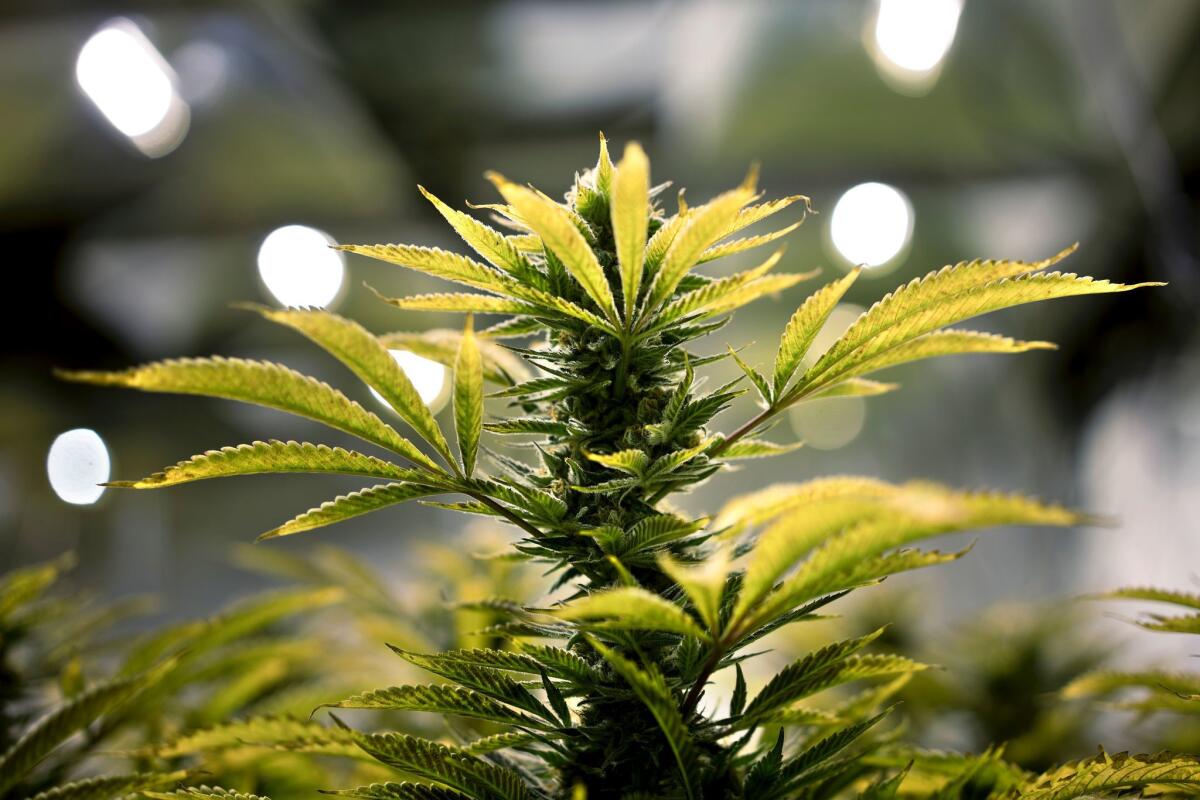Planning Commission addresses zoning issues for massage parlors and indoor-growing question raised by Prop. 64

A marijuana plant is shown in this file photo taken on April 19, 2016, at Alternative Solutions in Washington, D.C.
With an extended moratorium on massage parlors inside city limits set to expire soon, the La Cañada Flintridge Planning Commission Tuesday night discussed how to define such services and businesses in the city’s zoning code.
In a 4-1 vote, the commission approved sending the staff recommendation to the City Council for adoption. Commissioner Henry Oh was the lone dissenting vote.
Several sections of the city’s zoning code are up for a future vote, specifically two ordinances working in tandem that will affect the Downtown Village Specific Plan and the Community Planned Development zone in order to address the growth and associated criminal problems of the industry in other cities, which occurred mostly between 2009 and 2014, according to the staff report. The massage industry in other cities, like nearby Los Angeles, have been associated with prostitution and human trafficking.
Join the conversation on Facebook >>
“The point of this ordinance is to make sure it’s a legitimate massage establishment,” said Commissioner Rick Gunter.
The jurisdiction of massage-related businesses fell under the purview of local municipalities until 2009, when a state law was passed establishing the California Massage Therapy Council to oversee regulation and licensure.
That bill expired on Jan. 1, while another approved last year by Gov. Jerry Brown, the Massage Therapy Act (AB 1147), put the power of regulation and enforcement back in the hands of city officials. On April 20, 2015, La Cañada adopted a 45-day moratorium on issuing any permits on massage businesses. In June of that year, the city extended that moratorium for 22 months and 15 days.
One of the commission’s proposed ordinance language would define “massage” to mean “any method of treating the external parts of the body for remedial, health, hygienic or relaxation purpose” and to include “treatment by means of manual pressure, acupressure, friction, stroking, kneading, rubbing, tapping, pounding, vibrating, with or without the aid of or by means of any mechanical, electronic, or electrical apparatus or appliance, and with or without rubbing alcohol, liniments, aromatics, antiseptics, oils, powders, creams, lotions, ointments or other similar preparations.”
For a massage establishment to meet one of the terms for a conditional use permit, the ordinance proposes a distinction between a “massage establishment” and beauty and nail salons and would exclude businesses where less than 15% of the gross floor area is devoted to massage. One exclusion would apply to licensed barbers, beauticians and manicurists within the scope of the license where exemption applies to scalp, neck, back, forearms, hands, calves, and/or feet. There was also discussion on comparing recreational and therapeutic massages.
“We need to study the impacts and the appropriate zones,” Oh said.
Regulations for growing marijuana indoors
Also on Tuesday, commissioners approved a zone change regarding the indoor personal cultivation of marijuana. The vote was 4-0-1 in favor, with Commissioner Jeffrey McConnell recusing himself from the meeting “on an abundance of caution.” Although he did not specify at the time the nature of his concern, in an emailed comment sent Friday night, he stated, “My employer has clients that could create a perception of a conflict of interest in this matter. In order to ensure full transparency and eliminate any potential concerns, I recused myself from this decision.”
The local proposal commenced on a statewide election in favor of Proposition 64, aimed to legalize personal marijuana use, possession and cultivation, which would preempt local control. During the hours of the Planning Commission meeting as national, state and local results trickled in, the proposition was approved by California voters.
The staff report concluded that unregulated indoor marijuana cultivation may invite additional public health concerns, such as poor irrigation systems and electrical equipment modifications creating increased fire hazards.
The ordinance outlines two steps to get a marijuana cultivation permit, according to the staff report, which include an application submittal by the property owner and an inspection by the Division of Building and Safety and the L.A. County Fire Department.
“When the state embarks on a new item that has significantly large impacts in unintended ways, whether a permit or what is the right move, it is useful in our ordinance somewhere to enforce whether something becomes a nuisance,” Gunther said. “We expect most of this will be just fine, most of it if state law allows it. Somewhere if it has a bad apple, there’s some mechanism that’s there that explains this is not OK.”
Sanderson is a contributor to Times Community News.